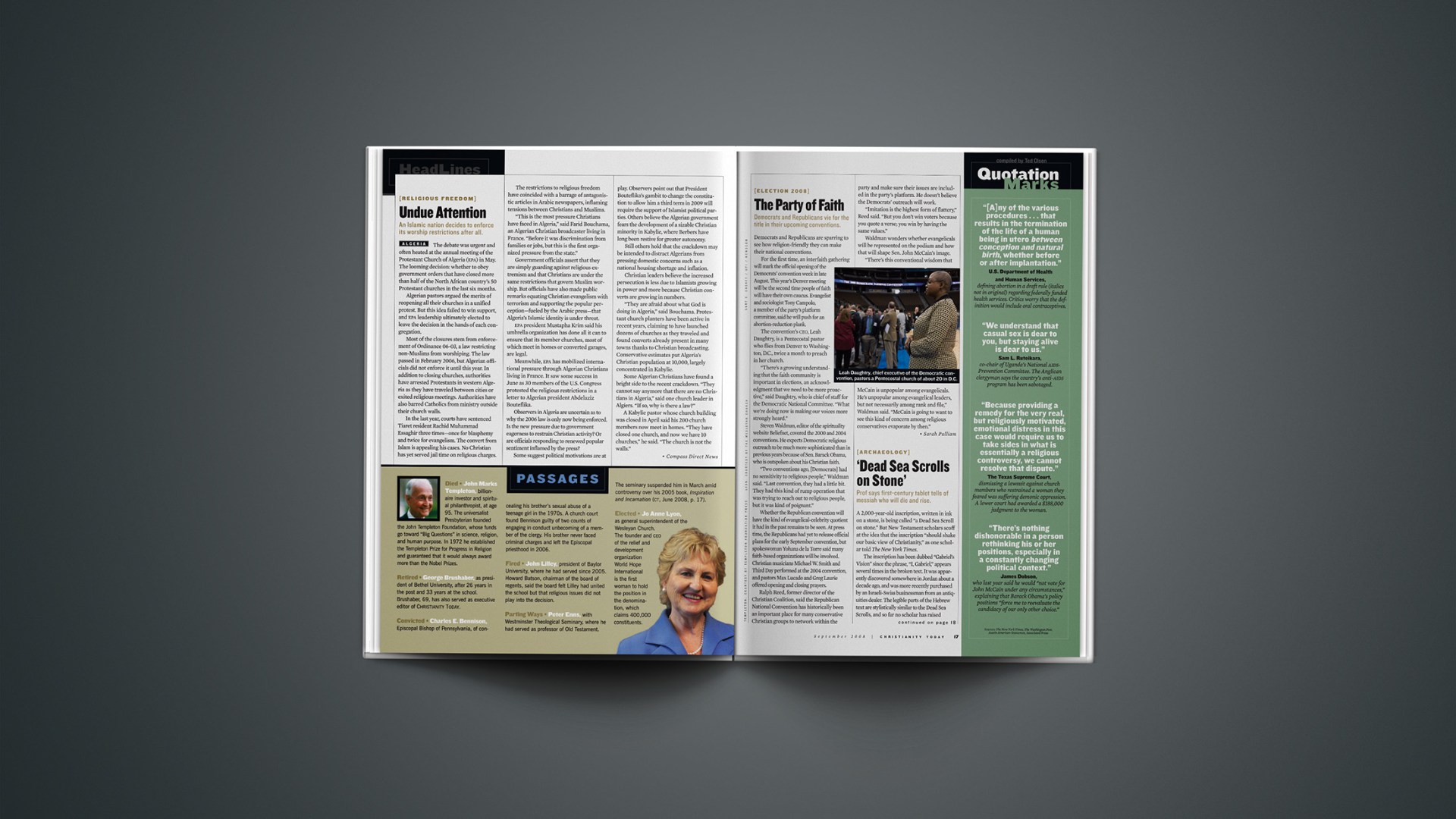The debate was urgent and often heated at the annual meeting of the Protestant Church of Algeria (EPA) in May. The looming decision: whether to obey government orders that have closed more than half of the North African country’s 50 Protestant churches in the last six months.
Algerian pastors argued the merits of reopening all their churches in a unified protest. But this idea failed to win support, and EPA leadership ultimately elected to leave the decision in the hands of each congregation.
Most of the closures stem from enforcement of Ordinance 06-03, a law restricting non-Muslims from worshiping. The law passed in February 2006, but Algerian officials did not enforce it until this year. In addition to closing churches, authorities have arrested Protestants in western Algeria as they have traveled between cities or exited religious meetings. Authorities have also barred Catholics from ministry outside their church walls.
In the last year, courts have sentenced Tiaret resident Rachid Muhammad Essaghir three times—once for blasphemy and twice for evangelism. The convert from Islam is appealing his cases. No Christian has yet served jail time on religious charges.
The restrictions to religious freedom have coincided with a barrage of antagonistic articles in Arabic newspapers, enflaming tensions between Christians and Muslims. “This is the most pressure Christians have faced in Algeria,” said Farid Bouchama, an Algerian Christian broadcaster living in France. “Before it was discrimination from families or jobs, but this is the first organized pressure from the state.”
Government officials assert that they are simply guarding against religious ex-tremism and that Christians are under the same restrictions that govern Muslim worship. But officials have also made public remarks equating Christian evangelism with terrorism and supporting the popular perception—fueled by the Arabic press—that Algeria’s Islamic identity is under threat.
EPA president Mustapha Krim said his umbrella organization has done all it can to ensure that its member churches, most of which meet in homes or converted garages, are legal.
Meanwhile, EPA has mobilized international pressure through Algerian Christians living in France. It saw some success in June as 30 members of the U.S. Congress protested the religious restrictions in a letter to Algerian president Abdelaziz Bouteflika.
Observers in Algeria are uncertain as to why the 2006 law is only now being enforced. Is the new pressure due to government eagerness to restrain Christian activity? Or are officials responding to renewed popular sentiment inflamed by the press?
Some suggest political motivations are at play. Observers point out that President Bouteflika’s gambit to change the constitution to allow him a third term in 2009 will require the support of Islamist political parties. Others believe the Algerian government fears the development of a sizable Christian minority in Kabylie, where Berbers have long been restive for greater autonomy.
Still others hold that the crackdown may be intended to distract Algerians from pressing domestic concerns such as a national housing shortage and inflation.
Christian leaders believe the increased persecution is less due to Islamists growing in power and more because Christian converts are growing in numbers.
“They are afraid about what God is doing in Algeria,” said Bouchama. Protestant church planters have been active in recent years, claiming to have launched dozens of churches as they traveled and found converts already present in many towns thanks to Christian broadcasting. Conservative estimates put Algeria’s Christian population at 10,000, largely concentrated in Kabylie.
Some Algerian Christians have found a bright side to the recent crackdown. “They cannot say anymore that there are no Christians in Algeria,” said one church leader in Algiers. “If so, why is there a law?”
A Kabylie pastor whose church building was closed in April said his 200 church members now meet in homes. “They have closed one church, and now we have 10 churches,” he said. “The church is not the walls.”
Copyright © 2008 Christianity Today. Click for reprint information.
Related Elsewhere:
Compass Direct has more news on religious rights in Algeria.










